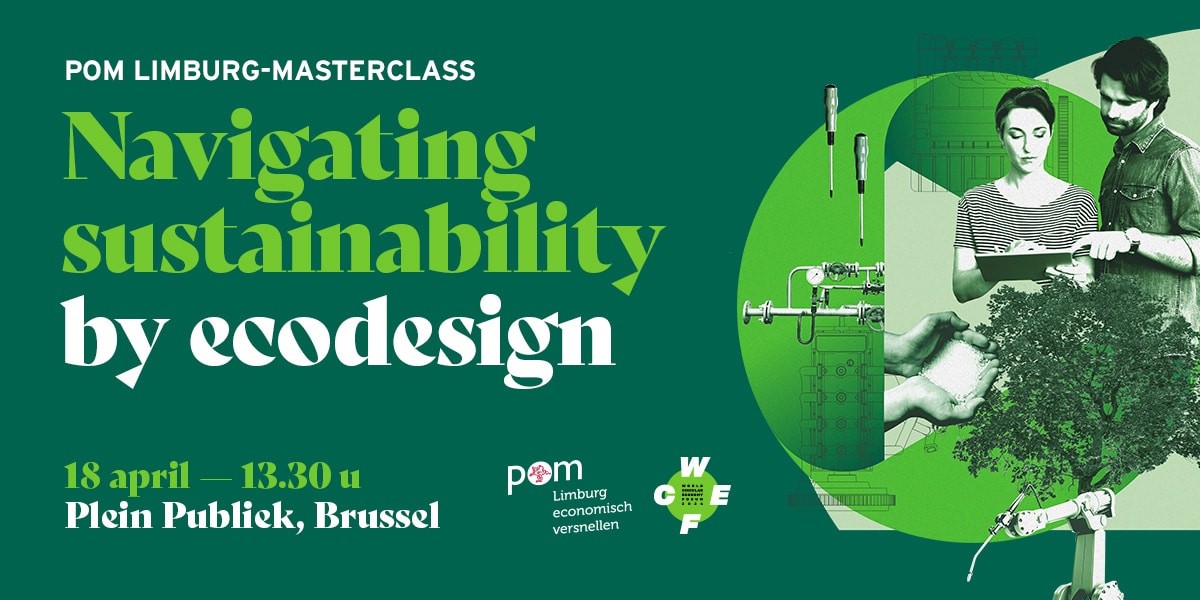
Navigating sustainability by ecodesign – a WCEF2024 accelerator session
Unlock the power of ecodesign to fundamentally rethink your products and processes, addressing 80% of the environmental impact and 70% of production costs. Expert insights from the plastic industry underscore the urgency of adopting ecodesign principles to enable a circular economy.
As the Regional Economic Development Agency of the province of Belgian Limburg, POM Limburg is organizing this Ecodesign summit on how to reconcile sustainable design with value creation and added value.
During this hybrid session, POM Limburg highlights the important role product designers play in facilitating the introduction of sustainable circular business models. Not only by connecting stakeholders at different stages of the life cycle but by also enabling the reuse and recycling of materials and products.
This event is an accelerator session at the World Circular Economy Forum 2024 (www.wcef2024.com).
Program
12:45 | Registration
13:30 | Plenary Session moderated by Isabel Vermeulen – TomorrowLab
Ecodesign, the link between ecology and circular economy
Karine Van Doorsselaer – University of Antwerp
Beyond Boundaries: Connecting Innovation, Business and Sustainability
Product design requires that stakeholders co-operate, bring together knowledge and share the responsibility for creating a circular system. In the case of plastic, these stakeholders include polymer producers, plastic compounders and converters, product designers, logistics companies, collection and sorting organizations, plastic recyclers, researchers and sector federations. To truly realize circularity, increased cooperation among these entities is necessary.
Annelies Gorissen – Regional Economic Development Agency of Limburg
Design products and systems for longer lifetimes
The focus is on creating durable, repairable, and reusable products and parts, thereby fostering a culture that values reuse, repair, and remanufacturing. Additionally, it encourages the adoption of service-based consumption and products, where the emphasis is on providing services rather than outright ownership of goods, contributing to a more sustainable and circular economy.
Birgitt Deckers – TomorrowLab
Smart design of products from the perspective of clean material cycles
Ecodesign entails optimizing products for easy recyclability, implementing design strategies that facilitate high-quality recycling and elevate recycling rates. Moreover, a crucial element of smart design involves the conscientious avoidance of hazardous chemicals in product composition. By adhering to these principles, smart product design not only contributes to cleaner material loops but also enhances overall recycling efficiency.
Evy Morssinkhof – Morssinkhof-Rymoplast
Jurgen van Peer – Zweko Optics
Is the substitution of fossil raw materials with bio-based feedstock an ecodesign approach?
The bio-economy focuses on replacing non-renewable resources with renewable ones to reduce the environmental impact of products. Identifying appropriate applications for bio-based and biodegradable plastics is crucial within this context. This involves determining where these materials are most effective, considering both performance and environmental considerations. It is important to define how much can be produced without going beyond the Earth’s carrying capacity.
Peter Geysenbergh – Soprema
Yvonne van der Meer – Aachen-Maastricht Institute for Biobased Materials
Contribute to circular plastics by improving the policy framework
Effective policies can promote the use of recycled materials, reduce the environmental impact of plastic production, and encourage the adoption of circular practices. Moreover, circular economy policies can stimulate innovation and create new economic opportunities. This can lead to job creation and economic growth while aligning with sustainable practices.
Martin Policar – European Commission
15:30 | Network Reception
Practical information:
Location: Plein Publiek – Kunstberg, 1000 Brussels
- Next to Brussels Central Station – Exit ‘Kunstberg’
- 100 metres walking distance from Square – Brussels Meeting Centre
This session will be available both physically and digitally and will be held in English.
*Physical registration for this event is closed.
You can follow the live stream via the button below.
